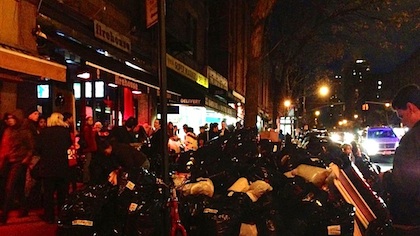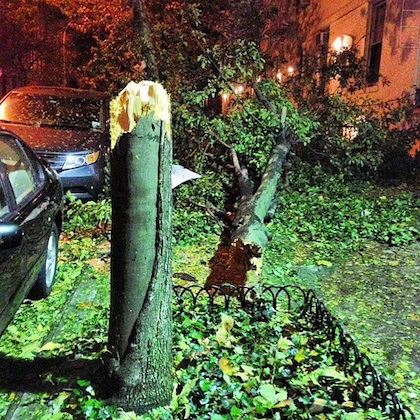SUMMARY
This is AI generated summarization, which may have errors. For context, always refer to the full article.

Morganville, New Jersey – Being one among hundreds whose flight was cancelled due to superstorm “Sandy,” and having seen her power ravage through New York and New Jersey (where I’d been in the last month-and-a-half on research) my thoughts were consequently led to the sudden ferocity of Mother Earth in these times of climate change.
“Mamera” (by the coins, in Filipino) was how my Dad would describe typhoons in our homeland. He said this in humor while we were experiencing Sandy literally shake my aunt’s house in Morganville where both parents now live. We were safe, thankfully, except for having to survive a power outage for a full week that left us cold without heater and other conveniences.
But I have nothing to complain about, especially after seeing many homes totally washed out along Jersey shore, and thousands of families still without power and homeless up to this day, in New York, Jersey and Connecticut. It was an epic catastrophe that no one in this part of America seemed prepared to face.
Environmentalists warn that America will have to brace for more high-powered typhoons as climate change takes a toll on more of earth’s lands, East or West, on a massive level. Sandy, as I read today from Time Magazine, was a freak hybrid tropical storm and hurricane, something that America should expect to have more due to the rising temperature in the world’s seas, including the Atlantic Ocean.
The higher our carbon footprint, the higher the temperature we generate. Everything is interconnected, as one of the deepest and most basic lessons of ecological consciousness would have it. As a college activist, I used to hum a similar tune from Joey Ayala’s song, “Lahat ng bagay ay magkaugnay.” (All things are interconnected.)
But more than humming eco-songs and debating about the “best” green agenda (which happened to be totally absent, by the way, in the recent US presidential debates), the fundamental question now brings us to what have I done and what can I still do to turn the tide of things? There is so much power in the human individual to contribute to the collective whole, either to the devastation or the re-creation of human life on earth.
In my own field of humanities and art education, our department has been gearing up to create a course called Arts and Ecology in order to align the power and relevance of art-making in these times of profound ecological disasters. One of my initiatives as faculty is to introduce my class to readings by Dr Masaru Emoto, the Japanese doctor who made a battery of tests on the world’s waters and their formation of crystals.
Emoto’s tests have shown how exposure to negative thoughts, images, words, and even to electronic gadgets, have the tendency to reduce, if not destroy, the natural power of water to form into beautiful crystals. On the contrary, water samples exposed to positive images, words, thoughts have a positive effect that allow water to form crystals.
And no matter how Emoto’s study is still contested by some quarters of the ultra-conservative Western scientific community, I believe that Emoto’s works on “The Hidden Messages of Water” is just a tiny fraction of the scientific world “catching-up” on what indigenous wisdom has already been practicing since time immemorial: the basic care and respect for the earth and its elements.
With care and love
It is common well-documented knowledge that nature responds to the conscient energy of human beings: how plants and matter flourish under the hands of one who sustains them with care and love, and how they die or suffer under opposite conditions. Seeing our own backyard garden bloom under my own mother’s meticulous hands has been such a powerful example for me as a child. Or how the best foods I have tasted were those that were home-cooked by loving hands in quiet kitchens, not necessarily those in fancy fastfoods and chef-led restaurants.
When we change our thought patterns on the basic level, from wasteful to positive or powerful, we then have a better chance of affecting matter in the way that she will respond with her natural best – as the benevolent and generous mother that she originally is.
But when we operate based on wasteful consciousness, on our acquired “taste” for greed and attachment to the material, we are led more into the global epidemic of consumer culture that has destroyed our innate values for sharing, respect and care. When we, as individuals, start to lack or even ignore this basic care for our inner ecology — losing our sense of care for our wellbeing in our thoughts, words and actions, feeding our minds with the garbage of negative thoughts, feelings and mindless choices — then our outer ecology suffers a similar fate.
The poor state of the human world today, what with nature’s recurring “freak shows,” is but a mirror of the inhumane state that the human consciousness has reached.

Manila’s jungle
And I don’t have to go to the US to know this. I have witnessed Manila turn into a concrete jungle of high-rise condos and malls in the last few years, resulting in more garbage and quicker floods even at the littlest spate of rains.
But this time, I know better than to blame MMDA or my neighbor’s garbage.
I have been a volunteer for the last 12 years in a global movement that has sought to bring about change from the inside-out. And one of the initiatives of this movement is a workshop called “Awakening the Dreamer,” a collaboration between the Pachamama Alliance and the Brahma Kumaris. It is a workshop meant to awaken in us our best potentials in order to respond to this most crucial period in human history. The 4-hour workshop asks 4 fundamental self-reflective questions:
- Where are we now as human beings?
- How did we get here?
- What is possible for the future?
- And finally, what will I do about it?
Incorporating appreciative inquiry, meditations and informative videos, the workshop allows one to decisively ponder on one’s role in the course of things for our future and of the earth’s. The materials are readily downloadable from the website (http://www.pachamama.org/bkwsu) and workshops have been successfully run in 12 countries, including Austria, Germany, Guatemala, Denmark, Hungary, India, Italy, Netherlands, Philippines, Switzerland, the US and Zambia.
It is the nick of time for you, me and our Mother Earth. What will you choose to do about it? – Rappler.com
Rina Angela Corpus is an assistant professor of the University of the Philippines Department of Art Studies. She is also a volunteer teacher with the Brahma Kumaris, an international NGO in consultative status with the United Nations, which has an ongoing multi-pronged, collaborative Environment Initiative.
Add a comment
How does this make you feel?
There are no comments yet. Add your comment to start the conversation.